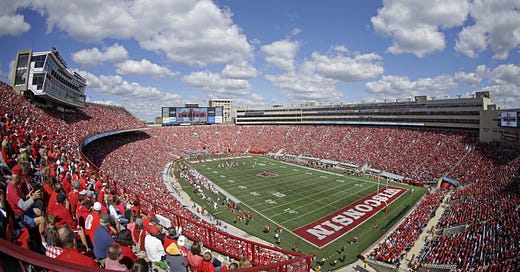Friday Feature: How Wisconsin’s Lawsuit Against Miami May Redefine NIL and Athlete Mobility in College Sports
What measures will institutions take to secure their rosters?
A College Football Matchup off the Field
In an unprecedented moment for the NIL era, the University of Wisconsin and the Big Ten Conference have filed a groundbreaking lawsuit against the University of Miami, alleging tampering and tortious interference involving former Wisconsin defensive back Xavier Lucas. The case, filed in Wisconsin state circuit court, centers around the claim that Miami staff and associates unlawfully induced Lucas to break a binding revenue-share agreement with Wisconsin, sidestepping NCAA rules and exploiting legal gaps in athlete mobility.
This lawsuit is the first known instance in which a university and a Power Five conference are taking legal action against another institution for NIL-related interference. The result of the case could establish binding legal precedent and potentially shift the balance of power in college sports by introducing enforceable legal standards into what has often been described as a lawless NIL marketplace.
The Case at Hand
According to court documents, Wisconsin alleges that Miami made impermissible contact with Lucas in December and January, encouraging him to exit the program despite being under contract. Lucas had signed a two-year revenue-sharing agreement with Wisconsin, set to take effect July 1 following the approval of the House v. NCAA antitrust settlement. The agreement was tied to direct university compensation for athletes and included restrictions on outside usage of name, image, and likeness by other schools.
Lucas did not enter the NCAA transfer portal. Instead, after reportedly receiving a more lucrative offer from Miami, he disenrolled from Wisconsin, reclassified his academic status, and enrolled at Miami in January. This sequence allowed him to avoid the formal portal process, which prohibits communication between schools and athletes who have not officially entered the system.
In its complaint, Wisconsin claims that Miami’s conduct was intentional and unjustified, violating the terms of the NIL agreement and harming the program’s contractual relationship with Lucas. While the university is not suing the player himself, it is seeking financial damages and a declaratory judgment against Miami.
The Legal Stakes
At the center of the lawsuit is a key question: Are NIL revenue-share agreements enforceable under traditional contract and tort law?
If the court affirms that Wisconsin’s agreement with Lucas constitutes a legally binding contract, it could open the door for more universities to pursue legal action when athletes are lured away by rival programs. It would also elevate NIL contracts to the level of enforceable employment-like agreements, effectively formalizing the idea that college athletes now operate within a regulated economic framework.
The suit also represents a new frontier for legal consequences related to tampering, a violation that has long been part of NCAA rules but rarely enforced. With NCAA investigators restricted by ongoing litigation and court orders, universities may now be shifting toward civil litigation as a primary enforcement mechanism.
Coaches and Conferences Want Accountability
Wisconsin is not alone in its frustration. The Big Ten has officially backed the suit, releasing a statement that emphasized the importance of respecting contractual obligations in order to preserve fairness across collegiate athletics.
High-profile coaches are echoing similar concerns. Arkansas head basketball coach John Calipari recently voiced his discontent with what he sees as a growing crisis.
“Tampering is out of control,” Calipari said during a press conference. “Players are being contacted before they even hit the portal. We can’t keep pretending this is NIL—it’s free agency without contracts.”
His comments reflect a growing consensus among coaches that, without consequences, NIL and the transfer portal have combined to create a chaotic environment where roster continuity is nearly impossible to maintain.
The Portal, the Loophole, and the Role of the Courts
Lucas’s decision to transfer without entering the portal has exposed a significant flaw in the NCAA’s system. Although the rules technically prohibit contact with athletes who are not in the portal, the NCAA has not shown the ability to enforce those regulations. Meanwhile, attorneys representing athletes, have begun to argue that even the portal itself may be legally problematic. Attorney’s have previously threatened to sue institutions for antitrust violations if the university did not release players into the portal.
This legal gray area leaves the courts as the final arbiter. If the Wisconsin case is successful, it will send a clear message that NIL agreements are not simply symbolic or conditional. They are binding contracts, and violating them carries legal risk. Such a ruling would incentivize schools and collectives to formalize deals with enforceable clauses, while discouraging third parties from engaging in unauthorized recruitment.
What Happens Next?
The outcome of this case could usher in a new era of NIL enforcement. Until now, tampering has been an open secret, condemned in press conferences but rarely challenged through legal channels. This suit raises the stakes, not only for Miami and Wisconsin, but for every program that relies on NIL agreements to retain talent.
As of July 1, universities will officially begin issuing direct revenue-share payments to athletes as part of the House settlement. Dozens of schools have already signed athletes to similar agreements. If these agreements are upheld in court, the Wild West phase of NIL could be ending, replaced by a contract-driven era with real accountability and legal boundaries.
Wisconsin v. Miami is not just a test of one athlete’s transfer. It is a test of whether the courts are ready to treat college athletes’ agreements with the same legal weight as professional contracts. The outcome could determine how far schools can go to protect their rosters and how much freedom athletes will retain in an evolving, professionalized NCAA landscape.
This is more than a lawsuit. It is a line in the sand.





